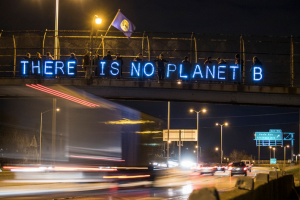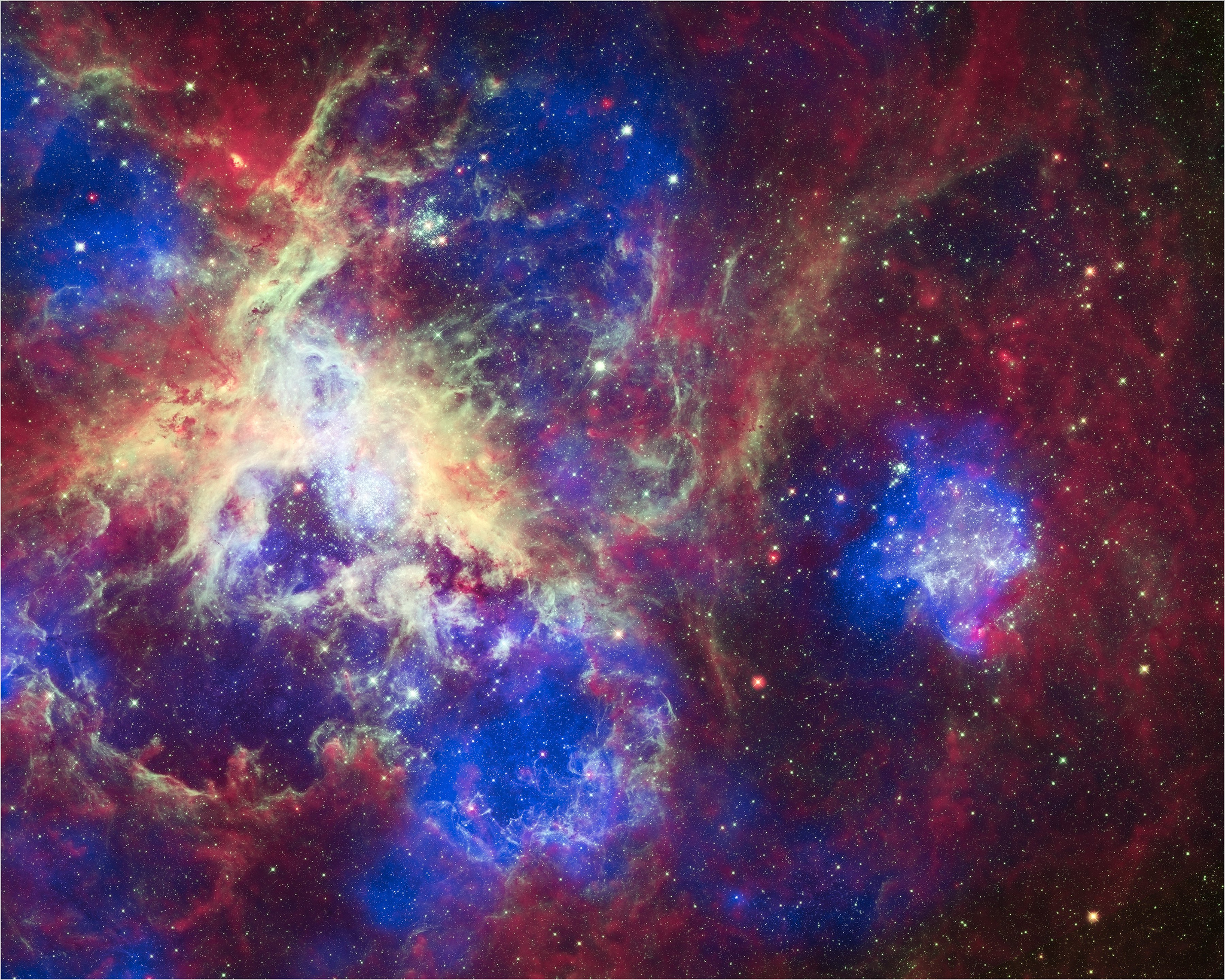The ethics of off-earth mining: expanding the discussion
This post was co-authored with Matthew Kearnes and is part of a collaborative research and writing project. I presented it today at the 2015 Off-Earth Mining Forum in Sydney.
This paper has been written in an effort to provide an accessible introduction to these ideas for the particular audience of that event, predominantly engineers, mining industry folks and various “space scientists”. Matt and I have a longer version of this work in progress that is developing these points in greater depth. This version also does not include any references.
In recent years the promises associated with emerging possibilities for off-Earth mining have prompted a new wave of speculation and enthusiasm. This presentation is part of a preliminary effort to outline an approach to some of the many ethical and political issues raised here. Drawing on recent work in the environmental humanities and science and technology studies – two interdisciplinary fields of enquiry – we’d like to offer some initial reflections on what is at stake in this fascinating and lively area from the perspective of the humanities.
Entanglements
 Our approach to ethics, like that of a great deal of contemporary work in the humanities, is grounded in the notion that our complex world cannot be neatly divided up in the ways that conventional disciplinary specialisations have tended to encourage us to. Consequently, an issue like off-Earth mining must be understood to be simultaneously scientific, technical, environmental, economic, cultural and more. Each of these general domains does not exist, and cannot be treated, in isolation from the others. Social and economic systems impact on the kinds of technological development that can be pursued. Equally, new scientific research reframes what we thought we knew about ourselves and our place in the universe: perhaps most strikingly in this context, we might think of the Copernican revolution and its decentring of the Earth, what Freud described as one of the “three great wounds” to western culture and humanity’s self image. Of course, new science and technology also opens up new economic possibilities and legal terrains. Sheila Jasanoff and colleagues have developed the idiom of “co-production” to think through these category crossing entanglements and their consequences.
Our approach to ethics, like that of a great deal of contemporary work in the humanities, is grounded in the notion that our complex world cannot be neatly divided up in the ways that conventional disciplinary specialisations have tended to encourage us to. Consequently, an issue like off-Earth mining must be understood to be simultaneously scientific, technical, environmental, economic, cultural and more. Each of these general domains does not exist, and cannot be treated, in isolation from the others. Social and economic systems impact on the kinds of technological development that can be pursued. Equally, new scientific research reframes what we thought we knew about ourselves and our place in the universe: perhaps most strikingly in this context, we might think of the Copernican revolution and its decentring of the Earth, what Freud described as one of the “three great wounds” to western culture and humanity’s self image. Of course, new science and technology also opens up new economic possibilities and legal terrains. Sheila Jasanoff and colleagues have developed the idiom of “co-production” to think through these category crossing entanglements and their consequences.
From this perspective, the topic of off-Earth mining cannot be considered in a meaningful way in isolation from the much larger set of challenges, possibilities and imaginaries that accompany human gropings, in all their forms, for a future beyond this planet. While it might be tempting to dismiss discussions of terraforming Mars or sending tourists into space as futuristic fantasy or unrelated revenue streams, the reality is more complex. In very material ways, but also at important discursive and conceptual levels, these pursuits are intimately entangled. And so we begin from the proposition that our ethical discussion must reflect this fact.
Off-Earth mining is, of course, conceived of by many as a bridging technology to other space activities. Even before the first resource has been harvested, the promissory capital circulating around the multibillion dollar satellite refuelling market, is already helping to remake technological possibilities, facilitating investment in a range of rocket, surveying and sampling, mining and asteroid retrieval technologies. If some of these possibilities pan out and enable the establishment of off-Earth mining operations, this ‘bridging’ potential would be extended even further: fuel, water and oxygen available beyond Earth’s atmosphere are expected to greatly reduce the cost of all manner of space projects, enabling them to be dramatically expanded in both space and time. It is in this context that Deep Space Industries, for example, has presented itself as: “the gas station, the oasis for food and water, and the building supply station for the frontier.”
But this mining activity, or perhaps even just its promise, also looks set to reshape space in other highly consequential ways. The proposed SPACE Act of 2015, currently before the US Congress, is just one example of the push to privatise space. Reproducing the time honoured logic that investment is only possible in areas characterised by sharply defined and vigilantly defended private property rights – central in the enclosure of everything from the indigenous lands of Hawai’i to the valuable genetic material of ovarian cancer patients – many space resource companies and their supporters are now calling for private property off-world. This would be a departure from the current situation which leans strongly towards a “common heritage” understanding of space, as enshrined in the UN’s 1967 Outer Space Treaty. The potential significance of this departure is perhaps most clear when we consider that this prohibition on property claims has long been understood as playing a key role in avoiding the militarisation of space, and potential conflicts on or off Earth over a range of new disputed territories and resources.
Perhaps even more significantly than any of these changes, current levels of “space enthusiasm” in the US, Australia and elsewhere – enthusiasm that is significantly connected to the promises of mining and what it might open up – have the potential to radically refigure our understanding of ourselves, our planet and our place in the universe. Who are we if we are no longer Earthlings? What might it mean to become responsible denizens of a vast universe? Which humans will these possibilities be open to and will they challenge or reinforce existing social inequities? What might the possibility of (some of) us freeing ourselves from ties to this planet at some (distant) point in the future do to our valuation of Earth? What might opening up the possibility – however unrealistic – that there may actually one day be a “Planet B” mean for long running discussion of the “limits to growth” and efforts to impose restrictions on anthropogenic environmental destruction?

Photo by Light Brigading (CC BY NC 2.0)
In short then, the consequential entanglements of off-Earth mining are not somehow contained within a thin operating space around the outside of our planet: they stretch out into space and extend themselves back down to Earth. Far from being a purely technical or scientific endeavour, off-Earth mining is bound up in co-productive relation with a range of issues that we might call economic, legal, cultural, political and military. As a result, off-Earth mining is increasingly shaping our understandings of ourselves and our world, while also shaping the societies that we live in. Importantly, these entanglements already exist; they aren’t waiting for proof of concept. Obviously it matters whether or not these grand technological visions pan out, and in what ways, but even if they never get off the ground they have already had a lasting impact – and that impact looks set to be greatly expanded in the coming years.
Worlding
When an issue like off-Earth mining is understood in this more entangled, co-productive, way, the potential ethical questions that it poses become similarly complex. A broad range of questions – from the economic and geopolitical, to the profoundly metaphysical – are, in different ways, tangled up and at stake here. From this perspective, ethics becomes a question of ‘worlding’. That is, asking: what kinds of worlds are we helping to produce and with what consequences for whom?
This approach differs from the more “regulatory” understanding of ethics, common in fields like bio-ethics, that some of you may be more familiar with. These regulatory approaches tend to arrive on the scene after the fact, and take up the work of articulating “limitations,” that is figuring out how to pursue some particular technological project in the “most ethical” way that is possible, or financially feasible.
In contrast, the ethical approach proposed here is much broader, and much more interested in holding open uncertainty and paying attention to the larger context that I have been pointing to. Ultimately, this approach is grounded in the deceptively simple question of cui bono? To whose benefit, who wins and who loses? That is, in asking who does what, and with what consequences for whom? Taking up this question is not simple. Doing so in a serious way necessarily requires us to ask what it means to ‘win’ or to ‘lose’ in a particular context.
Take the example of a proposal to scrape the regolith (surface material) from hundreds of kilometres of the lunar surface to collect valuable helium-3 (Milligan, 2013). Clearly, for some people this activity, if technically and financially feasible, would be a very positive outcome. For others, however, doing so would be an act of vandalism, of extreme disrespect, potentially undermining relationships with deities and/or ancestors. Or, when considering this proposal we might even ponder the ‘perspective’ of the reformed lunar landscape itself: would this activity constitute scarring, or might it be understood as ‘enhancement’? On what grounds can changes to abiotic landscapes be understood as ‘damaging’?[i]
The perspectives that might be taken on this single mining proposal are limitless. The purpose of ethics here is not to determine a finite group of relevant beings and then add up the wins and loses. Nor are we able to point to a single relevant ‘currency’ within which to think about what it means to win or lose – as, for example, utilitarian ethics tends to in its focus on minimising pain and suffering and maximising pleasure and enjoyment. Instead, attention to worlding is a richly descriptive and varied ethical space characterised by competing interests, but also competing notions of what constitutes the good.[ii] For this reason, the kind of ethical enquiry we are exploring cannot be undertaken from an armchair. As such, we’re planning interviews with diverse a range of people, including scientists and engineers, investors and entrepreneurs, artists and indigenous peoples – all with interests, of one sort or another, in what happens off-Earth.
In this context it is clear that there can be no single or final ethical answers. This is an undesirable position for those who would prefer their ethics to be of the more prescriptive variety. It would certainly be much easier and more convenient to be able to say “this is the answer – and here is the formula that you can apply next time.” But providing such answers is not the point of this kind of ethical approach. Instead, it is about what Donna Haraway has called “staying with the trouble,” that is, exploring and inhabiting complexity, multiplying perspectives, owning up to the fact that there is rarely a situation in which everyone wins – and yet actions will still be taken and so we must cast our lot with some possible world, some possible futures, and not others.
Cosmo-logic
Moving forward, our research aims to delve into some of the many ways that off-Earth mining, as an actual or an anticipated and imagined practice, is already shaping our world. We are also, of course interested in what the future might hold in this area. Everything is at stake here: from economic and military implications, to a broad range of cultural and imaginative possibilities for how we understand and narrate human life and the value of our planet.

Photo of Tarantula Nebula, taken by the Hubble (CC BY-NC 2.0)
The work that we are proposing moves beyond what are usually understood to be the limits of ‘ethical’ enquiry (at least in the regulatory sense described above). Instead, we are concerned with a broad range of fundamental questions relating to meaning, value, justice and purpose in a changing world. These are the questions that animate the humanities as larger fields of inquiry, and as such we would suggest that the humanities possess a range of tools and approaches relevant to discussions of off-Earth possibilities: from poetry and literature, to history, philosophy and anthropology. Of course, these disciplines must be drawn into dialogue with the natural sciences, engineering and related fields (as they increasingly are in areas like the medical and environmental humanities).
Inspired by philosopher and geologist Robert Frodeman’s effort to bring the humanities into an engagement with the earth in new and broader ways, what he calls a “geo-logic”, our proposal here might be understand as a kind of “cosmo-logic.” What we envisage, somewhat optimistically, is a broad-based enquiry – perhaps something like a ‘space humanities’ – that is up to the task of considering the many diverse ways that our changing relationships with outer space are today increasingly shaping possibilities for life; shaping what it is to be human and to live on a planet that, as we learn more and more, is becoming ever smaller and less significant, while somehow simultaneously becoming all the more miraculous.
Notes
[i] For yet others – human and not – the wellbeing of the biota and human communities that could be spared through reduced Earthly mining if such a project were to be carried out might be the central concern (such a reduction is far from guaranteed though).
[ii] ‘Flourishing’ is often used here as a notion of the good. Unlike pleasure and pain, for example, flourishing is a concept that can be extended beyond sentient actors. Plants and bacteria, for example, can certainly flourish. This concept might even be extended to consider the wellbeing of all the other kingdoms of life; perhaps even abiotic entities and landscapes. In large part it is the lack of a precise meaning that enables the broad applicability of flourishing as a concept. Arguably this same lack also means that the term doesn’t say much; but far from being a weakness this might be understood as one of its key strengths. As a concept, flourishing does not assume any specific or fixed outcome.
